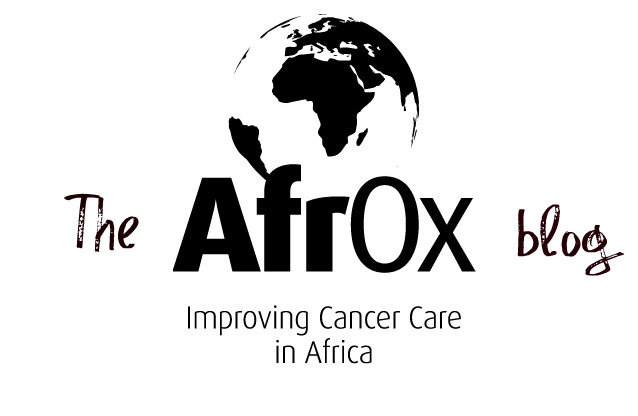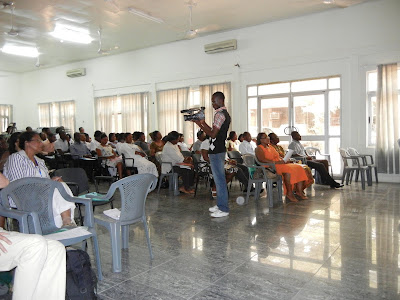In May, AfrOx ran a cancer nursing workshop in Malawi. Twenty-three nurses were trained, and four clinical officers and two doctors also participated in the workshop. Matron Loveness Nyirenda, the local coordinator, tells us about the importance of training nurses in Malawi...
Wednesday, 22 June 2011
Tuesday, 14 June 2011
Training Cancer Nurses in Malawi
In May, AfrOx ran a cancer nursing workshop in Malawi. Dr Ray Owen who works as an End of Life Counsellor was one of the trainers. He shares his experience with us...
I’m a clinical psychologist in the NHS, and for the last 18 years or so I’ve specialised in cancer and other serious physical conditions. Though a lot of my time is spent in face-to-face work with people with cancer and their families, I’m also very involved in teaching communication skills and psychological support skills to nurses, doctors and other staff who work in oncology.
I’m a clinical psychologist in the NHS, and for the last 18 years or so I’ve specialised in cancer and other serious physical conditions. Though a lot of my time is spent in face-to-face work with people with cancer and their families, I’m also very involved in teaching communication skills and psychological support skills to nurses, doctors and other staff who work in oncology.
When I was asked by Afrox to contribute to a training course for cancer nurses in Malawi and in Uganda, I was intrigued (and a little flattered!), but was initially doubtful how much the ideas and techniques that work in our own NHS would translate to a different culture, and to a drastically more resource-limited healthcare system.
Conversations with professionals already working out there, and now the days of experience with the wonderful Malawian nurses and doctors have convinced me my doubts were unfounded: these experienced and dedicated people are acutely aware of the importance of good communication and of providing psychological support.
I was fortunate enough to be teaching alongside Lynne Dodson, a fellow communication-skills trainer and highly experienced nurse. We quickly found that many of the approaches we’ve been working on in the UK
All of this of course is in the context of a poor country and a health system with few resources other than the dedication and compassion of staff making the best use of what the state (and foreign donors) contribute.
Every stage of diagnosis and treatment takes longer: just the lack of pathology services introduces a further 4 month delay in reaching a diagnosis – and any of us who have a had a family member undergo cancer tests knows just how stressful any wait can be.
Even the most basic cancer drugs can be unavailable, or only sometimes available, and way beyond the pocket of all but the very wealthiest; so distressing for the patient of a sick child.
The lack of any radiotherapy in Malawi means that very advanced and disfiguring tumours of a type we hardly see now in the UK
And, when someone needs to be in hospital, they have to have a ‘Guardian’; someone to deliver day to day care – washing, feeding, administering simple medicine which the tiny number of nurses on duty can’t possibly provide. Not only is that stressful for the Guardian, the impact of being far away from home can be destructive financially and to the rest of the family.
So many things need to change for all these problems to improve, but bit by bit they are already moving. And equipping the doctors with more skills and confidence is a vital part of that process. Hopefully, this is just the start for cancer nursing education in Malawi
Saturday, 7 May 2011
Full More Than Fufu
In April, an AfrOx team led an oncology training workshop in Ghana along with a team from World Child Cancer. Meaghann Shaw Weaver shares a special moment with us....
April started out with a full agenda at the oncology training workshop in Ghana. These two days of focused sessions offered training in oncology interventions and supportive care.
Much more than projects and pursuits, the real "fullness" of joy in Ghana comes from the strength of partnerships in working together for patient care. When removing the bandage from a biopsy site yesterday, a young patient's mum quietly told me "we must be brave together" and held my hand while I removed the tape. This is a mum who sits in a plastic chair next to her son's bed night after night, vigilant and hopeful in her bravery. This same mum insisted on sharing jollof rice with me today when she noticed I'd been at the hospital through lunch.
No matter that the day's serving of jollof rice was heaping and the fufu (pounded yam) expanded in my stomach, my heart still felt fuller than my stretched stomach at the day's close in Ghana. My heart feels full with admiration for the courage of patients, the perseverance of families, and the care offered by colleagues and mentors in Ghana. Ghana reveals the full potential of the human spirit when perseverance and partnership combine.
April started out with a full agenda at the oncology training workshop in Ghana. These two days of focused sessions offered training in oncology interventions and supportive care.
Much more than projects and pursuits, the real "fullness" of joy in Ghana comes from the strength of partnerships in working together for patient care. When removing the bandage from a biopsy site yesterday, a young patient's mum quietly told me "we must be brave together" and held my hand while I removed the tape. This is a mum who sits in a plastic chair next to her son's bed night after night, vigilant and hopeful in her bravery. This same mum insisted on sharing jollof rice with me today when she noticed I'd been at the hospital through lunch.
No matter that the day's serving of jollof rice was heaping and the fufu (pounded yam) expanded in my stomach, my heart still felt fuller than my stretched stomach at the day's close in Ghana. My heart feels full with admiration for the courage of patients, the perseverance of families, and the care offered by colleagues and mentors in Ghana. Ghana reveals the full potential of the human spirit when perseverance and partnership combine.
Tuesday, 12 April 2011
cancer prevention 4 africa
Raising awareness is a key part of AfrOx's work. But this doesn't just mean raising awareness about cancer in Africa - it also means raising awareness about how to PREVENT cancer.
In partnership with ESMO, we've launched a series of posters to be trialled in Ghana. The posters include how to check for symptons of certain cancers, as well as tips about cancer prevention.
The posters are free to download from the AfrOx website.
In partnership with ESMO, we've launched a series of posters to be trialled in Ghana. The posters include how to check for symptons of certain cancers, as well as tips about cancer prevention.
Monday, 7 February 2011
World Cancer Day
To mark World Cancer Day, the Ghana Health Service and Cancer Society of Ghana held a series of events in Accra to raise awareness of cancer.
The program of the day included a march by 500 school children to the National Hockey Stadium which was followed by speeches to raise awareness of the signs and symptoms of cancer amongst the general public.
Here are some snaps of the team, and the unveiling of AfrOx's Cancer Prevention posters...
To see the posters in all their glory, click here.
Saturday, 5 February 2011
Palliative Care Conference
Palliative care is an essential component of cancer care. Pain and symptom control, coupled with counselling and spiritual care, enables patients to die with dignity, preventing a painful and distressing death.
Research has shown, however, that 79% of the global morphine supply is used by only 6 countries (USA, Canada, France, Germany, Australia and Britain). In Africa, there are also restrictions on the prescription of morphine because of fears about addiction. Without access to palliative care, most cancer patients in Africa die in considerable pain.
At the end of January, AfrOx - in partnership with the American Society of Clinical Oncology and the Ghana Health Service - ran a palliative care workshop at the Korle Bu teaching hospital in Accra. There were 111 participants, ranging from medical students to social workers, representing nine of Ghana's ten regions.
The workshop gave an overview of what work is currently being done in Ghana on palliative care, and introduced models of palliative care being used in other African countries, including Uganda, Egypt and Tanzania. Discussions ranged from practical issues - such as pain medication - to ethics; while role-plays helped participants to explore how best to communicate with patients.
Before the conference, participants wanted to find out more information about what their role (as doctor, nurse, pharmacist, social worker), was in delivering palliative care to terminally ill patients. They wanted a greater understanding of treatment methods and drugs involved in palliative care, and to know how to identify pain in patients, especially when dealing with a child. We hope that the conference has armed them with the tools they need to start developing effective methods of palliative care in Ghana.
To find out more about our palliative care programme, click here.
Friday, 4 February 2011
Cancer is a Runaway Train
In October, we launched the AfrOx film competition, giving amateur film-makers the brief of making a short film to raise awareness about cancer in Africa.
At present, cancer kills more than 7 million people per year and is responsible for more deaths worldwide than AIDS, malaria and tuberculosis combined. It is estimated that if no action is taken, the situation will continue to deteriorate and by 2020 it is expected that there will be 16 million new cases per year. 70% of these new cases will occur in the developing world.
As Alan Milburn, former UK Secretary of State for Health and Chairman of AfrOx, described it,
"The rising incidence of cancer in Africa is like a runaway train coming down the track."
It was this "runaway train" that the competition winners, Hazel Taylor and Ben Donaldson used as the basis of their winning video...
The video was launced on World Cancer Day, in association with the European Society for Medical Oncology (ESMO), as part of the Cancer Prevention 4 Africa campaign.
To find out more about the campaign, click here.
At present, cancer kills more than 7 million people per year and is responsible for more deaths worldwide than AIDS, malaria and tuberculosis combined. It is estimated that if no action is taken, the situation will continue to deteriorate and by 2020 it is expected that there will be 16 million new cases per year. 70% of these new cases will occur in the developing world.
As Alan Milburn, former UK Secretary of State for Health and Chairman of AfrOx, described it,
"The rising incidence of cancer in Africa is like a runaway train coming down the track."
It was this "runaway train" that the competition winners, Hazel Taylor and Ben Donaldson used as the basis of their winning video...
The video was launced on World Cancer Day, in association with the European Society for Medical Oncology (ESMO), as part of the Cancer Prevention 4 Africa campaign.
To find out more about the campaign, click here.
Subscribe to:
Posts (Atom)





